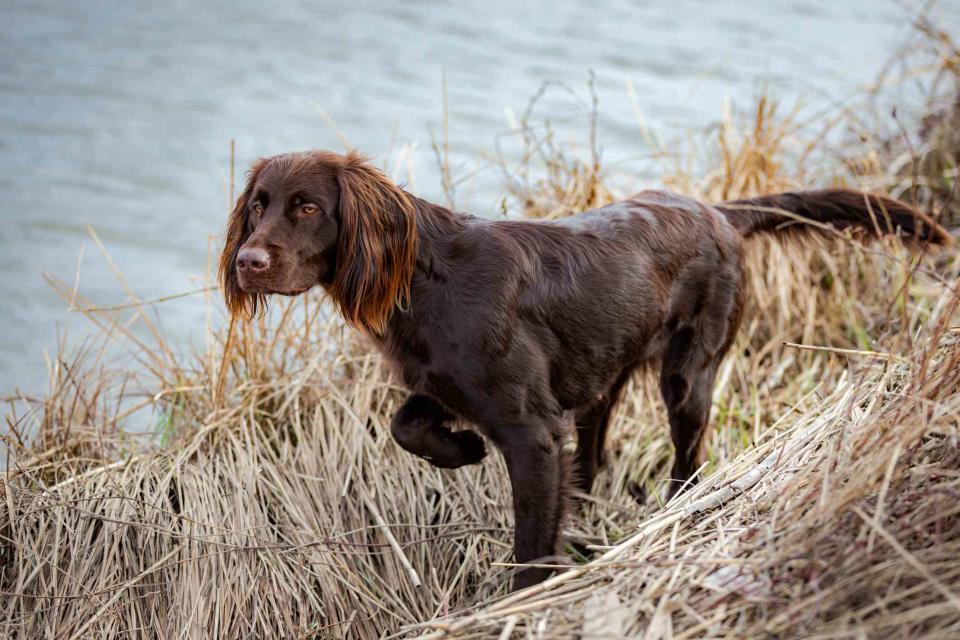German Longhaired Pointer: Dog Breed Characteristics and Care
History, Care Tips, and Helpful Information for Pet Owners

JWB Fotografie /
German longhaired pointers offer a great solution for someone looking for a versatile and friendly pointer breed with a slightly fluffier coat than their German cousins. This large breed dog can easily switch from being a calm family dog to an intense hunting dog, so if you're looking for a dog that fits into one of these categories, or even one in between, the German longhaired pointer may be for you.
Learn more about the care and breed characteristics of the German longhaired pointer.
Breed Overview
Group: Sporting
Height: 23-28 inches
Weight: 60-71 lbs
Coat: Double coat, medium length, straight to wavy
Coat Colors: Brown and white
Life Span: 12-14 years
Temperament: Friendly, affectionate, social
Hypoallergenic: No
Origin Country: German
Characteristics of the German Longhaired Pointer
The easiest way to describe a German longhaired pointer is to picture a German shorthaired pointer but with medium-length hair. This athletic breed is always brown and white with soft, double-coated hair, and is very social and friendly. Families, hunters, and active individuals will find this athletic breed an ideal fit.
Affection Level | High |
Friendliness | High |
Kid-Friendly | High |
Pet-Friendly | High |
Exercise Needs | High |
Playfulness | High |
Energy Level | High |
Trainability | High |
Intelligence | High |
Tendency to Bark | Medium |
Amount of Shedding | Medium |
History of the German Longhaired Pointer
A descendant of French and Spanish spaniels, the German longhaired pointer was bred to be a very adaptable gun dog breed and swimmer. First developed in the late 1800s, this medium-to-large dog is great at all types of hunting and can also be wonderful family dogs. German longhaired pointers can swim, point, track, retrieve, and play, making them an all-around fun dog for active families or individuals.
German Longhaired Pointer Care
High energy, a double coat, and a lot of intelligence are packed into the German longhaired pointer. These qualities combine to form one great dog breed—but only for someone willing to provide them with all the care they need.
Exercise
Because of their smarts and energy, the German longhaired pointer needs a good amount of exercise. This breed was bred to chase, run, and swim, so they're not going to be content lounging on the couch all day. Long walks or runs and plenty of space to play when they aren't hunting are necessary for the breed.
Grooming
This breed has a medium-length coat with a thick undercoat. They don't require much in the way of grooming unless they run through thick brush while hunting, but regular baths, brushing, ear cleaning, and nail trims are necessary.
Training
The German longhaired pointer is a very eager-to-please and highly trainable dog. Basic commands are a breeze for this breed, but they'll get bored if you don't put their mind to work after they learn how to sit and stay, so regular training sessions are necessary. Agility, rally, obedience, and other dog sports are great alternatives to training for hunting.
Common Health Problems
No dog breed is without any potential health problems, but German longhaired pointers have no known congenital or genetic issues to worry about. However, some common health problems that can develop in any dog of this size include:
Diet and Nutrition
Like all dogs, German longhaired pointers should eat a nutritionally complete diet formulated for dogs by veterinary nutritionists. Measure out the appropriate amount of food based on your dog's weight, age, activity, and caloric content to prevent obesity and other health issues. If you aren't sure what to feed, ask your veterinarian for recommendations.
Where to Adopt or Buy a German Longhaired Pointer
While some breeds are commonly found in shelters and rescues, German longhaired pointers are not a common breed. A reputable breeder is your best chance if you're looking to acquire this type of dog. Dog shows and the German Longhaired Pointer Club of North America may provide you with some options, but expect to pay between $1,000 and $2,000 for a healthy puppy (and be prepared to get on a waitlist).
Be careful with kennels that claim to breed a large variety of breeds or if they refuse to allow you to see the parents, which are signs of puppy mills and backyard breeders.
German Longhaired Pointer Overview
Pros
Friendly with other dogs
Very intelligent and trainable
Good with kids
Cons
Requires a lot of exercise
Is not hypoallergenic
Needs a lot of mental stimulation
10 Best Dog Breeds for Hunting
More Dog Breeds and Further Research
If you’re interested in similar breeds, check out:
Frequently Asked Questions
What’s the difference between a German longhaired pointer and a Viszla?
German longhaired pointers and Viszlas are both good at pointing and retrieving, but they are different in their appearances, size, and origins. Viszlas originated in Hungary, have short hair, and are a rust color. German longhaired pointers originated in Germany, have medium-length hair, and are brown and white.
Are German longhaired pointers good family dogs?
They can make excellent dogs for active families who can give them the physical exercise and mental stimulation they require.
Are German longhaired pointers good apartment dogs?
If you are committed to plenty of walks, exercise, playtime, and training, an apartment can be a good fit for this breed. If this breed is understimulated and bored in an apartment setting, they can get destructive.
Read the original article on The Spruce Pets.
